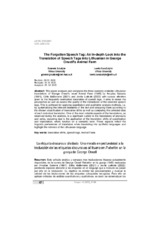Mostrar el registro sencillo del ítem
The Forgotten Speech Tag: An In-depth Look into the Translation of Speech Tags into Lithuanian in George Orwell’s Animal Farm
| dc.contributor.author | Jakaitytė, Gabrielė | |
| dc.contributor.author | Kamičaitytė, Loreta | |
| dc.date.accessioned | 2024-01-22T10:35:12Z | |
| dc.date.available | 2024-01-22T10:35:12Z | |
| dc.date.issued | 2023 | |
| dc.identifier.issn | 2255-3703 | |
| dc.identifier.uri | http://hdl.handle.net/10396/26638 | |
| dc.description.abstract | This paper analyses and compares the three currently available Lithuanian translations of George Orwell’s novel Animal Farm (1945) by Arvydas Sabonis (1991), Edita Mažonienė (2021) and Jovita Liutkutė (2022) with special attention given to the frequently overlooked translation of speech tags. It aims to reveal the peculiarities as well as assess the quality of the translations of the collected speech tags. This is achieved by applying quantitative and qualitative analysis methods, i.e. by systematising the relevant elements of the text and analysing them according to the chosen classification of translation shifts as well as comparing the collected data of each individual translation. One of the most notable aspects of the translations, as observed during the analysis, is a significant variety in the translations of pronouns and verbs, occurring due to the application of the translation shifts of specification and implicitation, which function on a semantic level. These aspects reflect the linguistic preferences of translators when translating into synthetic languages and highlight the richness of the Lithuanian language. | es_ES |
| dc.description.abstract | Este artículo analiza y compara tres traducciones lituanas actualmente disponibles de la novela de George Orwell Rebelión en la granja (1945) realizadas por Arvydas Sabonis (1991), Edita Mažonienė (2021) y Jovita Liutkute (2022), prestando especial atención a las etiquetas en el lenguaje que a menudo se pasan por alto en la traducción. Su objetivo es revelar las peculiaridades y evaluar la calidad de las traducciones de las etiquetas coloquiales recogidas. Para ello se aplican métodos de análisis cuantitativos y cualitativos, es decir, se sistematizan los elementos relevantes del texto y se analizan según la clasificación de métodos de traducción elegida, y se comparan los datos recogidos para cada traducción concreta. Uno de los aspectos más notables de las traducciones observadas en el análisis es la importante diversidad en la traducción de pronombres y verbos derivada de la aplicación de tales métodos de traducción, como la especificación y la implicación, que operan a nivel semántico. Estos aspectos reflejan las preferencias lingüísticas de los traductores a la hora de traducir a lenguas sintéticas y ponen de relieve la riqueza de la lengua lituana. | es_ES |
| dc.format.mimetype | application/pdf | es_ES |
| dc.language.iso | eng | es_ES |
| dc.publisher | UCOPress | es_ES |
| dc.rights | http://creativecommons.org/licenses/by/3.0/es/ | |
| dc.source | Skopos 14, 67-88 (2023) | es_ES |
| dc.subject | Translation shifts | es_ES |
| dc.subject | Speech tags | es_ES |
| dc.subject | Animal Farm | es_ES |
| dc.subject | Cambios de traducción | es_ES |
| dc.subject | Etiquetas coloquiales | es_ES |
| dc.subject | Rebelión en la granja | es_ES |
| dc.title | The Forgotten Speech Tag: An In-depth Look into the Translation of Speech Tags into Lithuanian in George Orwell’s Animal Farm | es_ES |
| dc.title.alternative | La etiqueta discursiva olvidada: Una mirada en profundidad a la traducción de las etiquetas discursivas al lituano en Rebelión en la granja de George Orwell | es_ES |
| dc.type | info:eu-repo/semantics/article | es_ES |
| dc.relation.publisherversion | https://www.uco.es/ucopress/ojs/index.php/skopos/index | es_ES |
| dc.rights.accessRights | info:eu-repo/semantics/openAccess |

